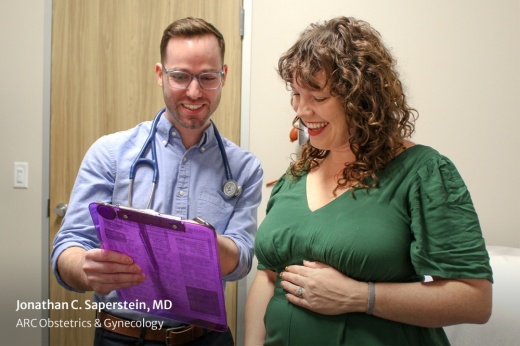“As a child, I was diagnosed with a chronic disease and spent a lot of time in the hospital and clinic. Witnessing the passionate care and nurturing bedside manner of my doctors inspired me to pursue a career in medicine,” said Jonathan C. Saperstein, MD, Ob/Gyn at ARC Center Street in Kyle. “In medical school, I fell in love with Ob/Gyn because of its variety. Not only do I get to perform deliveries and surgeries, I also have the opportunity to provide primary care for women and follow them throughout the many stages of their life.”
Austin Regional Clinic has many resources to help new moms. See below for common questions expecting mothers should ask before and during pregnancy.
What is genetic screening?
Genetic screening is a medical test that examines an individual's DNA to identify gene changes or mutations. This process helps assess the risk of passing on genetic disorders to future generations, offering invaluable insights into the potential risks of inherited diseases. From carrier testing to comprehensive genetic panels, these tests provide an overview of an individual's genetic makeup, aiding in family planning decisions.
What is cord blood banking?
Cord blood banking involves collecting and storing the blood from the umbilical cord of a newborn baby. The blood from the umbilical cord is rich in stem cells, which can be used in medical treatments. These stem cells have the potential to develop into various types of cells, such as blood, immune system and bone cells.
What is gestational diabetes?
Gestational diabetes is a type of diabetes that occurs during pregnancy. It can affect the mother's health and increase the risk of complications for the baby.
Complications may include:
- Increased risk of Type 2 diabetes in the mother
- Increased risk of obesity and Type 2 diabetes in the child
- Higher birth weight
- Low blood sugar in newborns
- Newborn respiratory distress syndrome
One of the first steps toward a healthy pregnancy is scheduling the first prenatal care appointment with an Ob/Gyn as soon as the woman knows she is pregnant, ideally at six to eight weeks of pregnancy. Early prenatal care is associated with numerous benefits, including the identification and management of potential issues, creating a solid foundation for a healthy pregnancy.
What happens during the first prenatal visit?
The visit typically involves a comprehensive discussion about the patient’s health, medical history and lifestyle. The Ob/Gyn may cover topics such as pregnancy history, underlying health conditions, medications and any potential concerns from the patient. Physical examinations, including a pelvic exam, pap smear and blood tests, may also be conducted to assess overall health.
How often are prenatal care visits typically scheduled?
The frequency of prenatal care visits is often determined by the trimester and whether it is a low-risk or high-risk pregnancy. In the first trimester, monthly visits are common, increasing to biweekly or weekly as the due date approaches. High-risk pregnancies may require more frequent monitoring to address specific concerns and ensure the well-being of both mother and baby.
What are ultrasounds?
With pregnancies, ultrasounds are a form of prenatal testing that utilize sound waves to create images of the developing fetus in the womb. These noninvasive procedures provide invaluable insights into fetal growth, health and the formation of essential body parts.
Why are ultrasounds important during pregnancy?
Ultrasounds are crucial for monitoring the health and development of the baby throughout pregnancy. They allow the physician to assess the baby's position, identify any potential birth defects and ensure overall well-being.
Are ultrasounds safe during pregnancy?
Numerous studies have affirmed the safety of ultrasounds during pregnancy. The technology employs sound waves, not radiation, making it a safe and noninvasive method for visualizing the fetus. Ultrasounds are routinely used in prenatal care to provide vital information without posing any known risks to the mother or the baby.
How soon can you see a baby on an ultrasound?
The excitement of seeing a baby on an ultrasound can be experienced as early as the first trimester. During the initial prenatal appointments, ultrasound technology allows the Ob/Gyn to detect the fetal heartbeat and observe the early stages of development.
How many ultrasounds do patients get during pregnancy?
The number of ultrasounds during pregnancy varies based on individual circumstances. Typically, expectant mothers can anticipate at least two ultrasounds—one in the first trimester and another in the second trimester.
What are the types of prenatal ultrasounds?
- Transabdominal ultrasound: This is the most common type of ultrasound, where a transducer is moved over the abdomen to create images of the fetus.
- Transvaginal ultrasound: This involves inserting a transducer into the vagina for a closer and more detailed view of the fetus, especially in the early stages of pregnancy.
- Take prenatal supplements.
- Eat a healthy, balanced diet.
- Engage in regular and moderate exercise.
- Ensure proper hydration.
- Limit caffeine intake.
There are a few important things to avoid during pregnancy, including anything raw, so no raw fish or meat. Make sure everything is cooked thoroughly to kill any bacteria, and absolutely no intake of alcohol, drugs or tobacco, including marijuana, as any of these can affect the development of the baby.
Every patient’s pregnancy journey looks different, so make sure to find the right Ob/Gyn physician or APC for you at Austin Regional Clinic.
“My goal is to make sure that each of my patients feels heard. I believe patient education and shared decision-making are incredibly important to arrive at a treatment plan tailored to each one’s specific needs and desires, while following guidelines and evidence-based medicine,” Dr. Saperstein said.
Visit ARCobgyn.com to learn more about all the Ob/Gyn services offered, find a location nearby, and for scheduling options to make an appointment today.
The above story was produced by Community Impact's Senior Multi Platform Journalist Sierra Rozen with information solely provided by the local business as part of its "sponsored content" purchase through our advertising team.

















